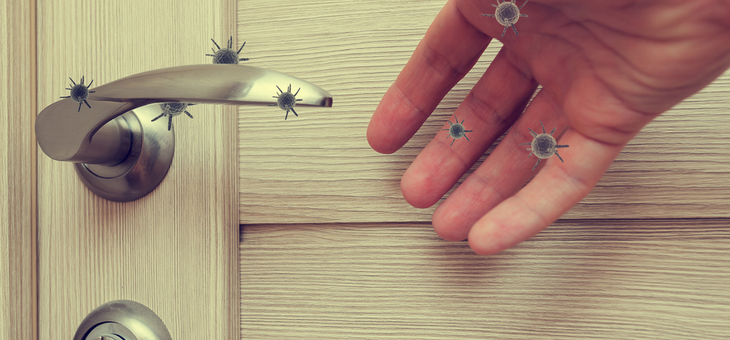There has been much research done on the COVID-19 virus and how long it lives on surfaces.
Upon discovery of the virus and in the weeks immediately following, the virus was believed to survive anywhere between two hours and four days, depending on the surface.
New research from Australia’s national science agency has discovered that it may live for even longer than previously thought.
Much longer, in fact.
The Commonwealth Scientific and Industrial Research Organisation (CSIRO) has found that, at the right temperature, it can linger on everyday surfaces for up to four weeks.
And the temperature at which the virus can survive longest is room temperature.
At 20°C, SARS-CoV-2 can survive at least 28 days on common surfaces such as steel, vinyl and glass – even plastic banknotes.
And mobile phone screens.
It stays on cotton for fewer than 16 hours at 40°C and up to two weeks at 20°C.
The lower the temperature, the longer the virus can survive on these surfaces, and it is more likely to live longer on non-porous or smooth surfaces rather than porous surfaces, except in the case of banknotes, where it survived longer on paper notes than it did on plastic notes.
The research team used the same amount of virus that would be found on someone who was infected and applied it to various surfaces to establish how long it survived.
The study aimed to help scientists more accurately predict and prevent the virus’s spread through better knowledge and advice.
“It’s important to know how long this virus can last so we know how often we need to disinfect things and what sort of risk common surfaces pose,” said the director of the Australian Centre for Disease Preparedness, Trevor Drew.
“Touchscreen devices such as mobile phones, bank ATMs, supermarket self-serve checkouts and airport check-in kiosks are high-touch surfaces which may not be regularly cleaned and pose a transmission risk.”
While previous research showed COVID-19 could be detected in aerosols for up to three hours and on plastic and stainless steel surfaces for up to three days, the new study revealed that the virus survives about six to seven days before losing potency. Or, in the case of glass and paper banknotes, more than one month.
“What we found was that even after two weeks, there was still plenty of live, infectious virus there which could potentially infect someone,” said Prof. Drew.
“We could extrapolate that to say even crockery in a restaurant was a potential source of infection because stainless steel is commonly used for cutlery.”
The research, published in Virology Journal, revealed that the COVID-19 virus lasts 10 days longer than influenza on some surfaces.
Influenza A survived on surfaces for 17 days, whereas COVID-19 lasted at least 28 days.
“It seems that it lasts longer than other viruses such as influenza, which only lasts a few days, or even other coronaviruses,” said the deputy director of the Australian Centre for Disease Preparedness, Debbie Eagles.
“While the precise role of surface transmission, the degree of surface contact and the amount of virus required for infection is yet to be determined, establishing how long this virus remains viable on surfaces is critical for developing risk mitigation strategies in high contact areas.”
The researchers not only hope to help better inform the community of virus transmission, but also assist governments in planning to reopen businesses and services to help kickstart the economy.
“Together, we hope this suite of solutions from science will break down the barriers between us, and shift focus to dealing with specific virus hotspots so we can get the economy back on track,” said Dr Larry Marshall, CSIRO chief executive.
How cautious are you after touching random surfaces? Do you still follow prescribed hygiene protocol to the letter, or have you become lax?
If you enjoy our content, don’t keep it to yourself. Share our free eNews with your friends and encourage them to sign up.
Related articles:
https://www.yourlifechoices.com.au/health/covid19/covid-reinfection-not-all-bad-news
https://www.yourlifechoices.com.au/health/covid19/covid19-lasts-longer-than-thought
https://www.yourlifechoices.com.au/health/covid19/longterm-effects-of-virus-become-clearer

